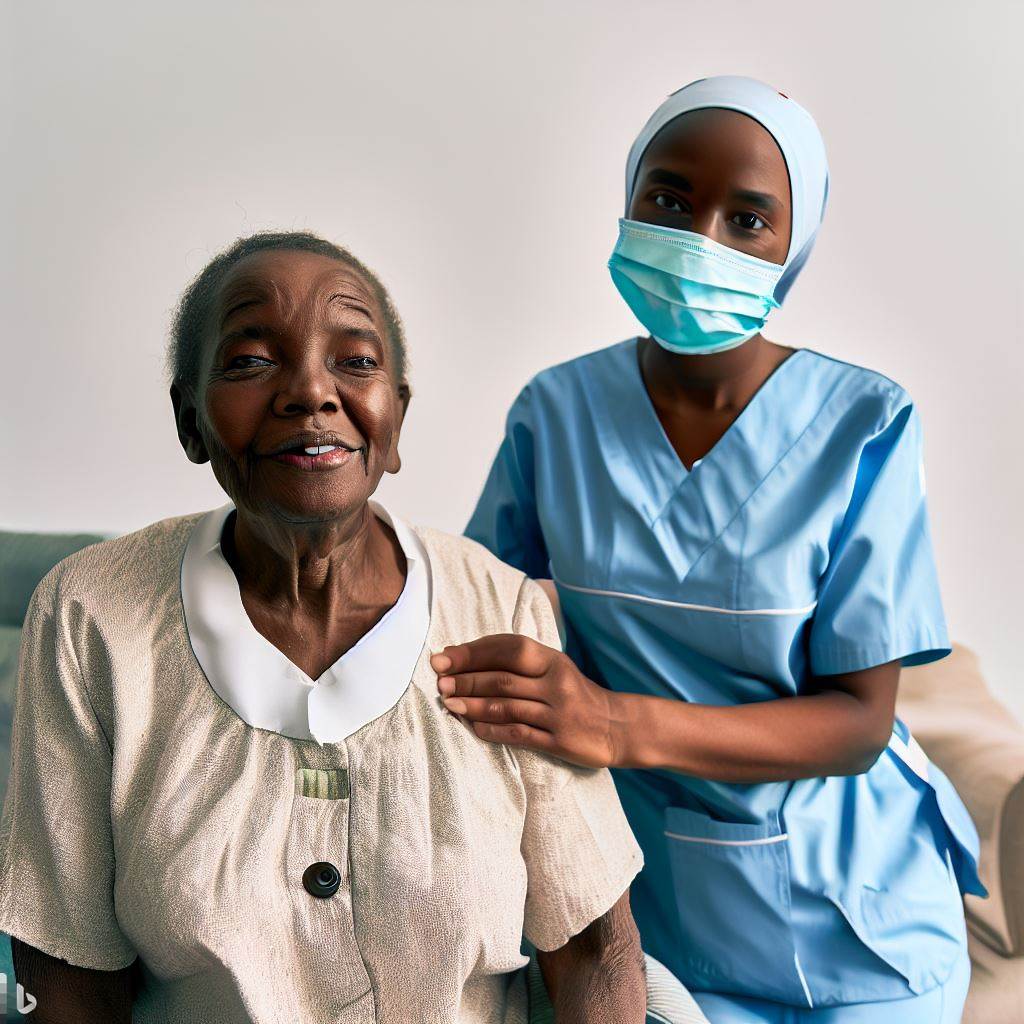Introduction
Nursing is a vital profession in Nigeria, providing healthcare services to individuals across the country.
With the increasing complexity of healthcare, nursing specialties have become crucial for providing specialized care to patients.
This blog post aims to explore the various nursing specialties in Nigeria, shedding light on their importance and the opportunities they offer nurses.
By the end of this section, readers will have a better understanding of the different nursing specialties available in Nigeria and the unique roles they play in the healthcare system.
Overview of Nursing Specialties
Nursing specialties refer to specific areas of expertise within the field of nursing.
These specialties allow nurses to focus their skills and knowledge on a particular aspect of patient care.
In Nigeria, there are various nursing specialties that nurses can choose from to meet the diverse healthcare needs of the population.
Definition of Nursing Specialties
Nursing specialties are distinct areas of practice that require specialized knowledge and skills beyond the basic nursing education.
They allow nurses to develop expertise in specific patient populations, diseases, or healthcare settings.
Explanation of the Different Areas of Specialization in Nursing
There are several areas of specialization in nursing, and each offers unique opportunities for nurses to contribute to patient care. Some of the popular nursing specialties in Nigeria include:
- Critical Care Nursing: Nurses in this specialty provide specialized care for patients who are critically ill or unstable. They work in intensive care units (ICUs), trauma centers, and emergency rooms.
- Pediatric Nursing: Pediatric nurses specialize in caring for children and adolescents. They provide comprehensive care, including physical examinations, immunizations, and health education.
- Obstetric and Gynecological Nursing: Nurses in this specialty focus on women’s health, including prenatal care, childbirth, and postpartum care. They also provide family planning services and reproductive healthcare.
- Psychiatric Nursing: Psychiatric nurses work with individuals experiencing mental health disorders. They provide therapy, administer medications, and support patients in managing their conditions.
- Community Health Nursing: Community health nurses promote and protect the health of individuals, families, and communities. They provide education, preventive care, and health promotion programs.
- Oncology Nursing: Oncology nurses specialize in caring for patients with cancer. They provide comprehensive care, including chemotherapy administration, symptom management, and emotional support.
- Geriatric Nursing: Geriatric nurses specialize in caring for the elderly population. They address age-related health issues, promote healthy aging, and provide end-of-life care.
Importance of Choosing a Nursing Specialty
Choosing a nursing specialty is crucial for several reasons:
- Personal fulfillment: Nurses who choose a specialty they are passionate about often experience greater job satisfaction and sense of fulfillment in their careers.
- Improved patient care: Specializing in a particular area allows nurses to acquire in-depth knowledge and skills, enhancing the quality of care they provide to patients.
- Career advancement: Nurses with specialized skills and expertise have greater opportunities for career advancement. They can pursue advanced certifications, leadership roles, or even become educators in their chosen specialty.
Meeting market demands: Some nursing specialties may be in higher demand than others due to population health trends or healthcare system priorities.
Choosing a specialty in demand can increase employment opportunities.
In fact, nursing specialties offer nurses the chance to specialize their skills and knowledge in specific areas of patient care.
These specialties play a crucial role in meeting the diverse healthcare needs of the Nigerian population.
By choosing a nursing specialty, nurses can enhance their career prospects and contribute to improving patient outcomes.
Read: Step-by-step Guide to Becoming a Nursing Assistant in Nigeria
Popular Nursing Specialties in Nigeria
Nursing is a diverse and rewarding profession that offers several specialties for healthcare professionals to choose from.
In Nigeria, there are various nursing specialties that cater to different patient populations and healthcare needs.
This blog section will explore some of the popular nursing specialties in Nigeria and provide insights into their duties, required skills and qualifications, as well as career opportunities and growth potential.
Pediatric Nursing
Pediatric nursing focuses on providing healthcare to infants, children, and adolescents.
Nurses in this specialty work closely with pediatricians and other healthcare professionals to ensure the well-being of young patients.
When it comes to duties and responsibilities, pediatric nurses administer medications, perform physical assessments, monitor vital signs, and educate parents and guardians on proper healthcare practices for children.
They play a crucial role in the growth and development of pediatric patients.
To excel in this specialty, pediatric nurses need strong communication and interpersonal skills, as they must work closely with children and their families.
They also require patience, compassion, and a deep understanding of the unique healthcare needs of children.
There are several career opportunities for pediatric nurses in Nigeria.
They can work in hospitals, pediatric clinics, schools, and community health centers.
With experience, pediatric nurses can also advance their careers by becoming pediatric nurse practitioners or nurse educators.
Critical Care Nursing
Critical care nursing involves providing specialized care to critically ill patients who require constant monitoring and intensive medical interventions.
Nurses in this specialty work in critical care units, such as the intensive care unit (ICU) or the cardiac care unit (CCU).
The duties and responsibilities of critical care nurses include managing and administering medications, monitoring patients’ conditions, operating life-support equipment, and collaborating with other healthcare professionals to ensure the best possible patient outcomes.
Required skills for critical care nursing include strong critical thinking and decision-making abilities, as nurses in this specialty often encounter complex and rapidly changing patient conditions.
They must also have excellent communication skills to effectively coordinate with the interdisciplinary healthcare team.
Career opportunities for critical care nurses are vast. They can work in hospitals, emergency departments, trauma centers, and specialized critical care units.
Advanced practice roles, such as nurse anesthetists or clinical nurse specialists, are also available for experienced critical care nurses.
Community Health Nursing
Community health nursing focuses on promoting the health and well-being of individuals, families, and communities.
Nurses in this specialty provide healthcare services outside of traditional hospital settings and often work in community clinics, schools, and homes.
Duties and responsibilities of community health nurses include conducting health assessments, providing preventive care, coordinating healthcare services, and educating communities on health promotion and disease prevention.
Community health nurses require a diverse set of skills, including strong assessment and communication skills, cultural competency, and the ability to work independently in various community settings.
They must also possess knowledge of public health principles and have a passion for serving underserved populations.
Career opportunities in community health nursing include working in government health agencies, non-profit organizations, and community health centers.
Nurses in this specialty can also pursue advanced practice roles, such as becoming family nurse practitioners or public health nurse specialists.
Mental Health Nursing
Mental health nursing involves providing care and support to individuals with mental health disorders.
Nurses in this specialty work in psychiatric hospitals, mental health facilities, and community mental health centers.
The duties and responsibilities of mental health nurses include assessing patients’ mental health conditions, administering medications, implementing therapeutic interventions, providing counseling and support, and collaborating with mental health professionals to develop treatment plans.
Required skills for mental health nursing include strong observation and assessment skills, excellent therapeutic communication abilities, empathy, and a non-judgmental attitude.
These nurses must be able to establish rapport and build trusting relationships with individuals experiencing mental health challenges.
Career opportunities for mental health nurses exist in both inpatient and outpatient settings. They can work in psychiatric hospitals, community mental health centers, substance abuse treatment facilities, and correctional facilities.
With experience and advanced degrees, mental health nurses can become psychiatric nurse practitioners or nurse educators.
In summary, Nigeria offers various nursing specialties that cater to different patient populations and specific healthcare needs.
From pediatric nursing to critical care nursing, community health nursing, and mental health nursing, there are numerous opportunities for nurses to make a difference in patient lives and contribute to the healthcare system.
Each specialty requires specific skills and qualifications, and offers diverse career opportunities and potential for growth.
Nurses should consider their interests, strengths, and passion for particular patient populations when choosing a nursing specialty to pursue.
Read: Top Nursing Schools: A Comprehensive Guide for Nigerians

Less Common Nursing Specialties in Nigeria
Occupational health nursing
- Occupational health nurses are responsible for promoting and maintaining the health and well-being of workers in various industries.
- They provide preventive care, treat work-related injuries, and educate workers on safety measures.
- To excel in this specialty, nurses need excellent communication, problem-solving, and critical thinking skills.
- Career opportunities in occupational health nursing include working in factories, construction sites, and corporate organizations.
Nurse anesthesia
- Nurse anesthetists play a vital role in the operating room by administering anesthesia to patients undergoing surgery.
- Their responsibilities include monitoring the patient’s vital signs, adjusting anesthesia levels, and ensuring the patient’s comfort and safety.
- To become a nurse anesthetist, one must possess a bachelor’s degree in nursing, gain experience in critical care, and complete a specialized anesthesia program.
- Nurse anesthetists have excellent career prospects and can work in hospitals, surgical centers, or private practices.
Nursing informatics
- Nursing informatics combines nursing science and information technology to enhance patient care and healthcare systems.
- Nurses in this specialty collect, analyze, and manage healthcare data to improve patient outcomes and streamline clinical operations.
- Skills required for nursing informatics include proficiency in technology, data analysis, and strong knowledge of healthcare policies and procedures.
- Career opportunities in nursing informatics include working in hospitals, healthcare technology companies, and research institutions.
In fact, Nigeria offers various less common nursing specialties that provide unique opportunities for nursing professionals.
Occupational health nursing focuses on promoting worker health in various industries, while nurse anesthesia involves administering anesthesia during surgeries.
Nursing informatics combines nursing science and technology to improve patient care and healthcare systems.
These specialties offer diverse career pathways and contribute to the advancement of healthcare in Nigeria.
Read: How to Become a Diagnostic Medical Sonographer in Nigeria
Factors to Consider When Choosing a Nursing Specialty
When choosing a nursing specialty in Nigeria, there are several factors that should be taken into consideration:
Personal interest and passion
- It is important to choose a nursing specialty that aligns with your personal interests and passion.
- Consider what areas of nursing you are most passionate about and would enjoy working in.
- If you have a particular interest in pediatric nursing or geriatric care, for example, you may want to pursue a specialty in those areas.
Availability of job opportunities
- Research the job market to determine which nursing specialties have a higher demand for professionals in Nigeria.
- Consider the current and projected job opportunities in your desired nursing specialty.
- If there is a shortage of nurses in a particular specialty, it may offer more job prospects and career growth.
Required training and education
- Consider the training and education required for the nursing specialties you are interested in.
- Some specialties may require additional certifications or advanced degrees.
- Assess your willingness and ability to pursue the necessary training and education.
Salary and benefits
- Take into account the salary and benefits associated with different nursing specialties.
- Some specialties may offer higher salaries or additional perks such as flexible scheduling or bonuses.
- Consider how the salary and benefits align with your financial goals and lifestyle.
Work-life balance
- Consider the work-life balance in different nursing specialties.
- Some specialties may require long hours or on-call shifts, while others may offer more predictable schedules.
- Assess how the work hours and demands of the specialty will fit into your personal life and commitments.
In a nutshell, choosing a nursing specialty in Nigeria requires careful consideration of personal interest and passion, job opportunities, required training and education, salary and benefits, and work-life balance.
It is important to weigh these factors to make an informed decision that aligns with your career goals and personal preferences.
Read: The Journey to Becoming a Registered Nurse in Nigeria
Steps to Pursue a Nursing Specialty in Nigeria
When it comes to pursuing a nursing specialty in Nigeria, there are certain steps that aspiring nurses must take.
These steps will help them gain the necessary skills, knowledge, and experience to excel in their chosen field. Here are some important steps to consider:
Research and Gather Information
The first step in pursuing a nursing specialty in Nigeria is to research and gather information about the different specialties available.
This will help nurses understand the requirements, responsibilities, and career prospects associated with each specialty.
Nurses can also reach out to professionals already working in their desired specialty to gain insights and guidance.
Enroll in Specialized Training Programs or Courses
Once nurses have identified their desired specialty, they should look for specialized training programs or courses that will provide them with the necessary knowledge and skills.
These programs or courses may be offered by nursing schools, hospitals, or professional organizations.
Enrolling in such programs will allow nurses to gain in-depth knowledge and hands-on experience specific to their chosen specialty.
Obtain Necessary Certifications or Licenses
After completing the required training programs or courses, nurses must obtain the necessary certifications or licenses to practice in their chosen specialty.
This may involve passing specific exams or meeting certain criteria set by regulatory bodies.
These certifications or licenses not only validate nurses’ expertise but also ensure patient safety and quality of care.
Gain Practical Experience through Internships or Residency Programs
Practical experience is crucial for nurses to develop their skills and gain confidence in their chosen specialty.
Nurses can seek out internships or residency programs that offer hands-on training under the guidance of experienced professionals.
These programs provide valuable opportunities to apply knowledge in real-world settings and enhance clinical decision-making abilities.
Overall, pursuing a nursing specialty in Nigeria requires a systematic approach.
Nurses must research, enroll in specialized training programs, obtain certifications, and gain practical experience.
By following these steps, aspiring nurses can pave a successful career path in their chosen nursing specialty.
Read: How to Build a Career Network as a Home Health Aide in Nigeria
Uncover the Details: Nigerian Dental Association: An Overview
Challenges and Rewards of Nursing Specialties in Nigeria
Nursing specialties in Nigeria offer unique challenges and rewards that shape the experiences of nurses in these specific areas of healthcare.
It is important to understand and appreciate both the challenges and rewards associated with nursing specialties in Nigeria.
Potential challenges in specific specialties:
Nurses working in specific specialties often face a heavy workload and high levels of stress.
The demands of these specialized areas can be overwhelming and require nurses to be physically and mentally resilient.
Communication challenges are also common in nursing specialties. Nurses in specialized areas often need to communicate complex medical information to both patients and other healthcare professionals.
Effective communication is crucial for patient care and can sometimes be difficult due to language barriers or a lack of adequate resources.
The emotional impact of nursing specialties cannot be underestimated.
Nurses often deal with challenging and emotionally charged situations, such as witnessing patient suffering or delivering difficult news to patients and their families.
The emotional toll can be significant and require nurses to have strong coping mechanisms and support systems in place.
Read: The Path to Becoming a Surgeon in Nigeria
Rewards and benefits of nursing specialties:
Despite the challenges, nursing specialties in Nigeria offer numerous rewards and benefits to nurses.
One major reward is the opportunity to specialize in a desired area.
Nurses can choose to focus their careers in areas such as critical care, pediatrics, oncology, or geriatrics, among others.
This specialization allows nurses to develop expertise and become highly skilled in their chosen field.
Another significant reward is the personal satisfaction that comes from making a difference in patients’ lives.
Nurses in specialties have the opportunity to provide specialized care and support to patients in need, improving their health outcomes and overall well-being.
Career advancement and growth are also common in nursing specialties.
Nurses who specialize often have more opportunities for career development, such as becoming nurse educators, clinical nurse specialists, or nurse managers.
These career advancements offer additional challenges and rewards beyond clinical practice.
In fact, nursing specialties in Nigeria come with their own set of challenges and rewards.
It is important for nurses to be aware of the potential challenges and develop strategies to cope with them.
Additionally, the rewards and benefits of nursing specialties offer immense personal and professional satisfaction, making specialized nursing a fulfilling and rewarding career path.
Read: Home Health Aide Job Opportunities in Different Nigerian States
Conclusion
In review, nursing specialties in Nigeria play a crucial role in providing specialized care to patients and addressing various healthcare needs.
The importance of nursing specialties cannot be overstated, as they contribute to enhanced patient outcomes and improved healthcare services in the country.
Therefore, it is highly encouraged for nurses to explore different specialties and pursue their interests in order to broaden their horizons and contribute to the overall advancement of the nursing profession.
By taking the time to explore and specialize in a specific area of nursing, nurses can develop expertise and skills that can benefit both themselves and their patients.
In addition, pursuing a nursing specialty allows nurses to contribute to the healthcare system in a meaningful and impactful way, addressing specific needs and improving healthcare delivery.
Finally, I invite readers to share their experiences and insights regarding nursing specialties in Nigeria.
Sharing experiences can inspire and educate others, while questions can spark valuable discussions and further knowledge exchange.
Let us come together to encourage and support nurses on their journey to explore different specialties and make a significant difference in the Nigerian healthcare landscape.




